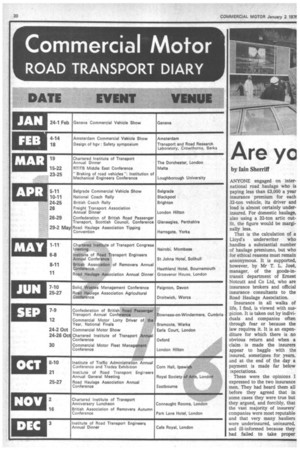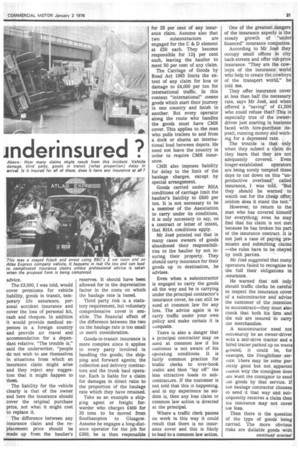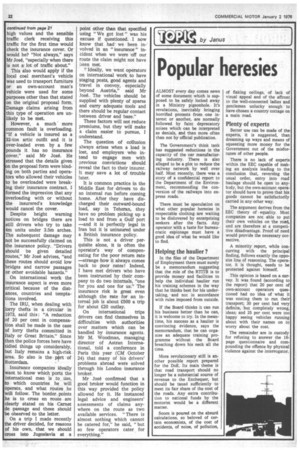Are ro
Page 22

Page 23

Page 24

If you've noticed an error in this article please click here to report it so we can fix it.
inderinsure
by lain Sherriff
ANYONE engaged on international road haulage who is paying less than £3,000 a year insurance premium for each 32-ton vehicle, its driver and load is almost certainly underinsured. For domestic haulage, also using a 32-ton artic outfit, the figure would be marginally less.
That is the calculation of a Lloyd's underwriter who handles a substantial number of haulage premiums, but who for ethical reasons must remain annonymous. It is supported, however, by Mr T. L. Jose, manager, of the goods-intransit department of Ernest Notcutt and Co Ltd, who are insurance brokers and official insurance consultants to the Road Haulage Association.
Insurance in all walks of life, I find, is viewed with suspicion. It is taken out by individuals and companies often through fear or because the law requires it. It is an expenditure for which there is no obvious return and when a claim is made the insurers appear to haggle with the insured, sometimes for years, and at the end of the day a payment is made far below :..xpectations.
These were the opinions I expressed to the two insurance men. They had heard them all before they agreed that in some cases they were true but they argued, and forcibly, that the vast majority of insurers' companies were most reputable and that very many hauliers were underinsured, uninsured, and ill-informed because they had failed to take proper advice.
The £3,000, I was told, would cover premiums for vehicle liability, goods in transit, temporary life assurance, personal accident insurance and cover the loss of personal kit, cash and cheques. In addition it would provide medical expenses in a foreign country and provide air travel and accommodation for a dependant relative. "The trouble is," said the underwriter, "people do not wish to see themselves in situations from which an insurance claim might arise and they reject any suggestion that it might happen to them.
The liability for the vehicle clearly is that of the owner and here the insurance should cover the original purchase price, not what it might cost to replace it.
The difference between any insurance claim and the replacement price should be made up from the haulier's reserves. It should have been allowed for in the depreciation factor in the costs on which the haulage rate is based.
Third party risk is a statutory requirement, but voluntary comprehensive cover is sensible. The financial effect of the difference between the two on the haulage rate is too small to merit consideration.
Goods-in-transit insurance is more complex since it applies to every party involved in handling the goods; the shipping and forward agents; the collection and delivery contractors and the trunk haul operator. Each is liable for a claim for damages in direct ratio to the proportion of the haulage rate which they have retained.
Take as an example a shipping agent or freight forwarder who charges £400 for 20 tons to be moved from Southampton to Glasgow. Assume he engages a long-distance operator for the job for £300, he is then responsible for 25 per cent of any insurance claim. Assume also that two subcontractors are engaged for the C & D element at £50 each. They become responsible for 12+ per cent each, leaving the haulier to meet 50 per cent of any claim.
The Carriage of Goods by Road Act 1965 limits the extent of any claim for loss or damage to E4,000 per ton for international traffic. In this context "international" means goods which start their journey in one country and finish in another. But every operator along the route who handles the goods must have CMR cover. This applies to. the man who pulls trailers to and from a dock or shunts an international load between depots. He need not leave the country in order to require CMR insurance.
CMR also imposes liability for delay to the limit of the haulage charges, except by special arrangement.
Goods carried under RHA conditions of carriage limit the haulier's liability to £800 per ton. It is not necessary to be a member of the Association to carry under its conditions, it is only necessary to say, on a contract or letter of intent, that RHA conditions apply.
Mr Jose pointed out that in many cases owners of goods abandoned 'their responsibilities to the haulier by not insuring their property. They should carry insurance for their goods up to destination, he advises.
Even when a subcontractor is engaged to carry the goods all the way and he is carrying under the principal contractor's insurance cover, he can still be sued at common law for any loss. The advice again is to carry traffic under your own policy and make certain it is e.uequate.
There is also a danger that a principal contractor may be sued at common law if his customer is not aware of his operating conditions. It is fairly common practice for traffic clerks to over-book traffic and then "lay off" the less attractive loads to subcontractors. If the customer is not told that this is happening, and in my experience he seldom is, then any loss claim or common law action is directed at the principal.
Where a traffic clerk passes on work in this way it could result that there is no insurance cover and this is likely to lead to a common law action. One of the greatest dangers of the insurance aspects is the steady growth of "under financed" insurance companies. According to Mr Jose they occupy small offices in city back-streets and offer cut-price insurance. "They are the cowboys of the insurance world • who help to create the cowboys of the transport world," he told me.
They offer insurance cover at less than half the necessary rate, says Mr Jose, and when offered a "saving" of £1,500 who could refuse that? This is especially true of the ownerdriver just starting in business faced with hire-purchase deposit, running money and working for a depressed rate.
The trouble is that only when they submit a claim do they learn that they are not adequately covered. Even longer-established operators are being sorely tempted these days to cut down on this "unproductive overhead" called insurance, I was told. "But they should be warned to watch out for the cheap offer; seldom does it stand the test."
However, to return to the man who has covered himself for everything; even he may find that his claim is not met because he has broken his part of the insurance contract. It is not just a case of paying premiums and submitting claims —the rules have to be obeyed by both parties.
Mr Jose suggested that many operators failed to recognise to the full their obligations in insurance.
He warned that not only should traffic clerks be careful to inspect the insurance cover of a subcontractor and advise the customer of the intention to subcontract—they must also check that both his firm and the sub are insured to carry the merchandise.
A suocontractor need not kieces s drily be an owner-driver witn a self-drive tractor and a hired trailer parked up on waste ground; it could be, for oxallipie, the Freightliner service. There may be some perrectiy good but not apparent ieason why the consignee does uoi, want the consignor to send Lhe goods by that service. If toe haulage contractor chooses to send it that way and Subsequently receives a claim then Ins insurance may not cover tne loss.
Then there is the question of the type of goods being carried. The more obvious risks are dutiable goods with high values and the sensible traffic clerk receiving this traffic for the first time would check the insurance cover. Or would he? "Not always," says Mr Jose, "especially when there is not a lot of traffic about."
This also would apply if the local coal merchant's vehicle was used to transport furniture or an own-account man's vehicle were used for some purposes other than that stated on the original proposal form. Damage claims arising from this type of operation are unlikely to be met.
However, a much more common fault is overloading. "If a vehicle is insured as a 32-ton artic outfit and it is over-loaded even by a few pounds it has no insurance cover," said Mr Jose. He stressed that the details given on the proposal form were binding on both parties and operators who allowed their vehicles to be overloaded were breaking their insurance contract. I formed the impression that any overloading with or without the insurered's knowledge would cancel the cover.
Despite height warning notices on bridges there are still drivers who try to take 4m units under 3.5m arches. The subsequent damage may not be successfully claimed on the insurance policy. "Drivers should be given detailed routes," Mr Jose advises, "and these routes should avoid low bridges and narrow passages or other avoidable hazards."
On international work the insurance aspect is even more critical because of the distances, countries and temptations involved.
The IRU, when dealing with lorry thefts in a circular in 1973, said this: "A reduction of 20 per cent in compensation shall be made in the case of lorry thefts committed in Italy or Great Britain." Since then the police forces here have tidied things up considerably, but Italy remains a high-risk area. So also is the port of Rotterdam.
Insurance companies ideally want to know which ports the international man is to use, to which countries he will operate, and what routes he will follow. The border points he Is to cross en route are clearly stated on his Carnet de passage and these should be observed to the letter.
On a trip I made recently the driver decided, for reasons of his own, that we should cross into Jugoslavia at a point other than that specified using "We got lost" was his excuse if questioned. I now know that had• we been involved in an "insurance" incident when we were off our route the claim might not have been met.
"Ideally, we want operators on international work to have staging posts, good agents and travel in convoy, especially beyond Austria," said Mr Jose. The vehicles should be supplied with plenty of spares and carry adequate tools and there should be regular contact between driver and base."
These factors will not reduce premiums, but they will make a claim easier to pursue, I understand.
The question of collusion always arises when a load is lost, and employers who intend to engage men with Drevious convictions should reveal the fact to their insurer. It may save a lot of trouble later.
It is common practice in the Middle East for drivers to do an internal run before coming home. After they have discharged their outward-bound load, say in Teheran, they have no problem picking up a load to and from a Gulf port —and it Is perfectly legal in Iran but it is uninsured under a British insurance policy.
This is not a driver perquisite alone, it is often the operator's way of compensating for the poor return rate —strange how it always comes back to poor rates! Indeed, I have met drivers who have been instructed by their company to do two internals, "one for you and one for us." The insurance risk is great even although the rate for an internal job is about £500 a trip for about £20 outlay.
On international trips drivers can find themselves in difficulties with authorities over matters which can be handled by insurance agents. Mr M. Woodman, managing director of Astran International, told a conference in Paris this year (CM October 24) that many of his drivers' problems abroad were solved through his London insurance broker.
Mr Jose confirmed that a good broker would function in this way provided the policy allowed for it. He instanced legal advice and engineers' assessments of claims anywhere on the route as two available services. "There is almost nothing which cannot be catered for," he said, "but so few operators cater for everything."




































































